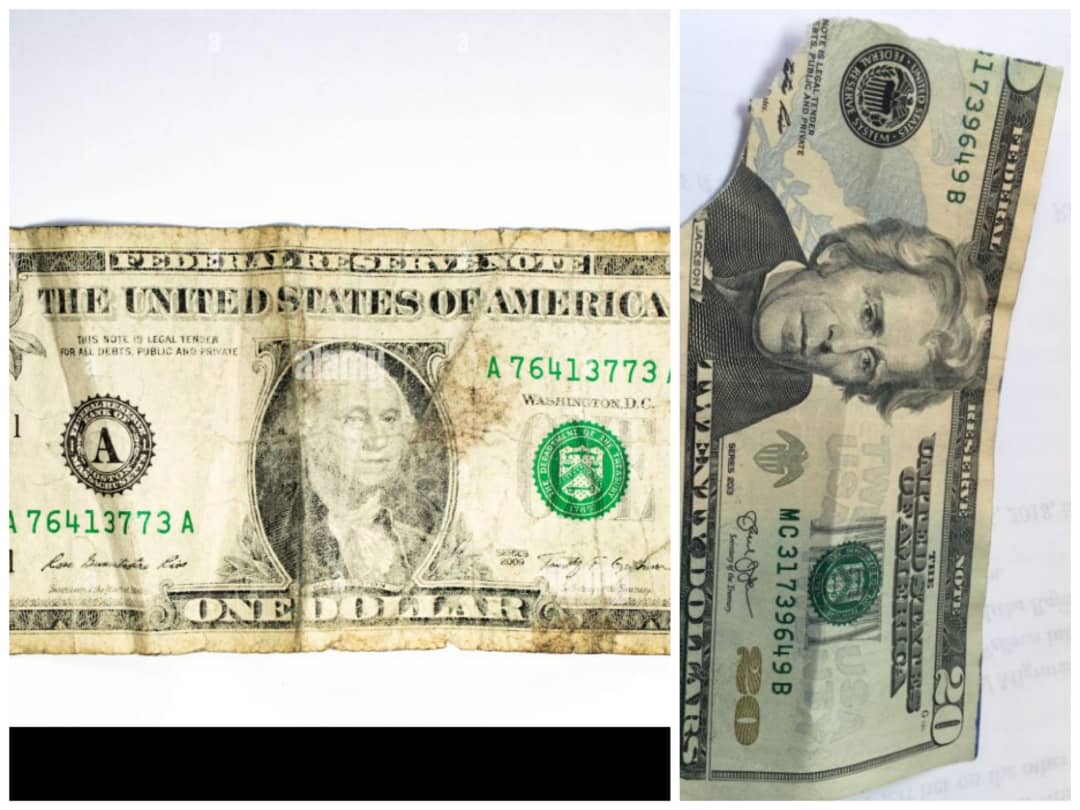Chantelle Bongubukhosi Ncube
In Zimbabwe, the rejection of old or worn-out US dollar notes by vendors, commuter omnibus (kombi) conductors, and even supermarkets has become a widespread challenge to citizens at large, especially in Bulawayo.
Despite the US dollar being the widely accepted currency in the country, worn notes are increasingly deemed useless, causing inconvenience and financial hardship for many citizens. This practice is negatively impacting both the economy and the daily lives of individuals, with Bulawayo being the most affected.
The US dollar, which was adopted alongside the Zimbabwean dollar following the economic meltdown of 2008, has become essential for everyday transactions. However, as the currency circulates and wears out, many informal and formal traders are refusing to accept tattered or torn notes. This has created a dilemma for many people who rely on these notes to make purchases or pay for transportation, leaving them stranded and frustrated.
In interviews conducted with residents of Bulawayo, several people shared stories of how old US dollar notes caused them significant inconvenience. One resident, Nkosana Dube, narrated how a kombi conductor refused to accept his worn-out $1 bill, forcing him to walk several kilometers to his workplace.
“I had no choice but to walk from Pumula to the city center because the kombi wouldn’t accept my old dollar note,” Dube said, emphasizing the inconvenience caused by the widespread rejection of old money.
“It’s frustrating when you know the money is still legal tender but you can’t use it.”
Vendors in the local informal markets, where the US dollar remains the dominant currency, are also notorious for refusing worn-out notes, often arguing that they will not be able to use them elsewhere. This has forced many citizens to resort to informal money changers, who either discount the value of worn-out bills or outright reject them.
The rejection of the worn out notes has created another market for purchasing these notes, albeit at a loss to the seller.
For instance if a US$10 is deemed worn out or torn, the seller will be given half the value in exchange.
Impact on the Economy and Society
The rejection of old US dollar notes has not only inconvenienced individuals but is also affecting the broader economy. Zimbabwe’s economic reliance on cash-based transactions, especially in the informal sector, means that any disruption to the circulation of currency has widespread repercussions.
According to a 2023 report by the Zimbabwe National Statistics Agency (ZimStat), 67% of Zimbabwe’s population participates in the informal economy, where cash is still king.
The rejection of worn-out US dollar notes limits access to essential goods and services, reduces consumer spending, and further entrenches financial exclusion for the most vulnerable members of society.
In Bulawayo, where kombis are the primary mode of transport for the majority of the population, the refusal to accept old worn out currency is leading to more people being left without a means to get to work or school, disrupting their livelihoods. The newly introduced ZiG is not a legal tender for any public transport in Bulawayo.
Unfortunately, it is in the Kombis that these worn out or torn notes are vehemently refused by conductors and drivers.
Vendors, on the other hand, find themselves having to turn away customers, further constraining the already difficult business environment.
Psychological Stress and Disruption of Daily Life
Aside from economic ramifications, the societal impact cannot be overlooked. Refusing valid currency causes unnecessary stress for individuals who are already dealing with high inflation and unemployment. For many, it’s not just about money it’s about the stress and anxiety of trying to get through the day without the fear of being rejected by a vendor, bus driver, or cashier for something as small as the condition of a dollar bill.
While the Reserve Bank of Zimbabwe (RBZ) has acknowledged the issue of worn-out notes in circulation, more needs to be done to address the growing problem. Here are some potential solutions:
- Public Awareness Campaigns: The RBZ should launch public awareness campaigns to inform both consumers and vendors that old and worn US dollar notes are still legal tender and must be accepted. Clear guidelines on what constitutes acceptable wear and tear should be communicated to avoid confusion.
- More Accessible Exchange Services: Banks and authorized foreign exchange dealers should make it easier for people to exchange worn-out US dollar notes for newer ones. Currently, many people find it difficult to access formal banking services, and creating designated exchange points could alleviate this issue.
- Encouraging Digital Transactions: With the growing penetration of mobile money and other electronic payment platforms, the government and private sector could incentivize the use of digital payment systems. This would reduce the reliance on physical cash and minimize the issue of worn-out currency.
- Clear Regulations for the Informal Sector: The government could implement clearer regulations for the informal sector to ensure vendors and public transport operators adhere to the acceptance of worn-out notes.
The refusal of worn-out US dollar notes in Zimbabwe, particularly in Bulawayo, has grown into a serious problem, affecting both individuals and the economy at large. With the majority of the population relying on cash transactions, the rejection of old money is causing widespread inconvenience and hardship.
By adopting a multi-pronged approach, raising awareness, making note exchanges more accessible, and encouraging digital payments the authorities would greatly assisted the marginalized people of Bulawayo.
Zimbabwe can mitigate the negative impact of this issue and help alleviate the financial and emotional strain it imposes on its citizens.
This persistent problem highlights the fragility of Zimbabwe’s cash-based economy and the urgent need for measures that ensure that all currency, regardless of its condition, remains in circulation for the benefit of the entire society.
Zim GBC News©2024


